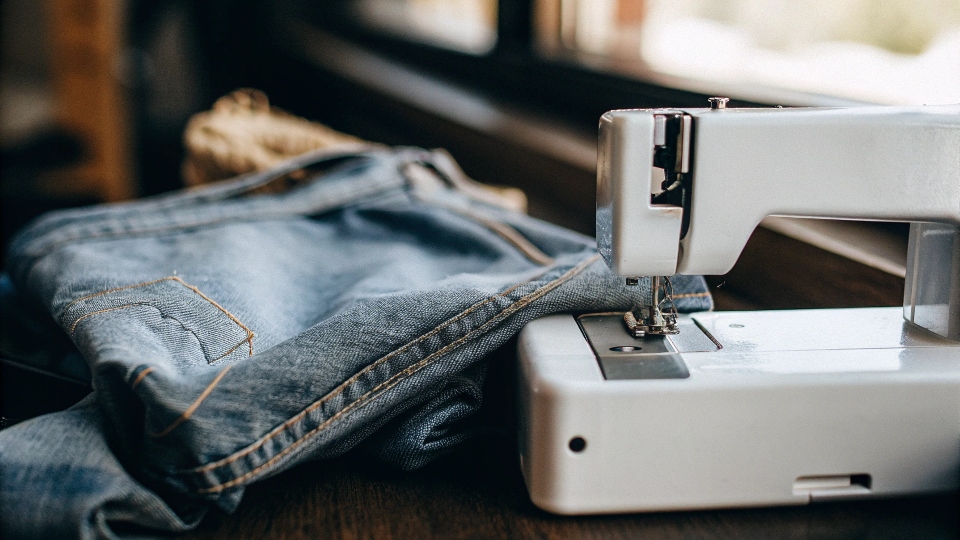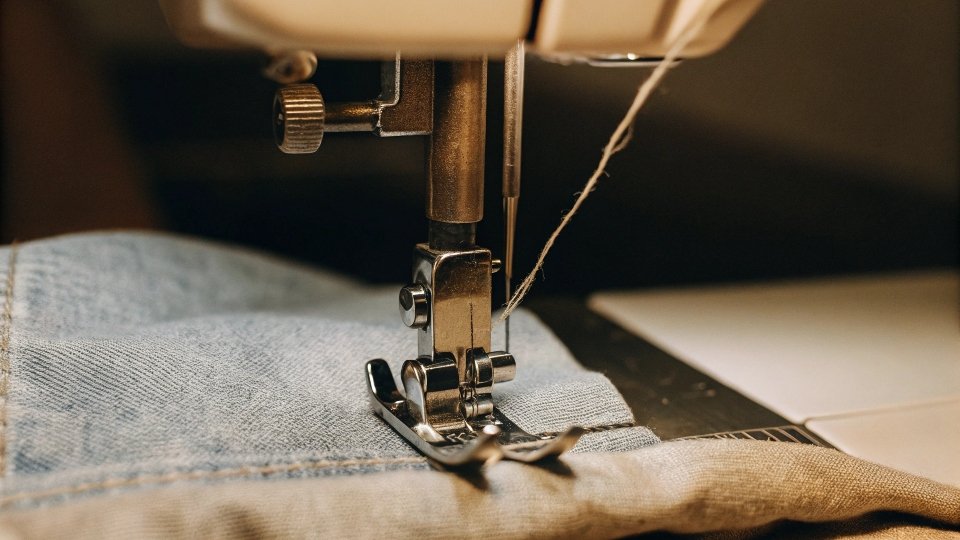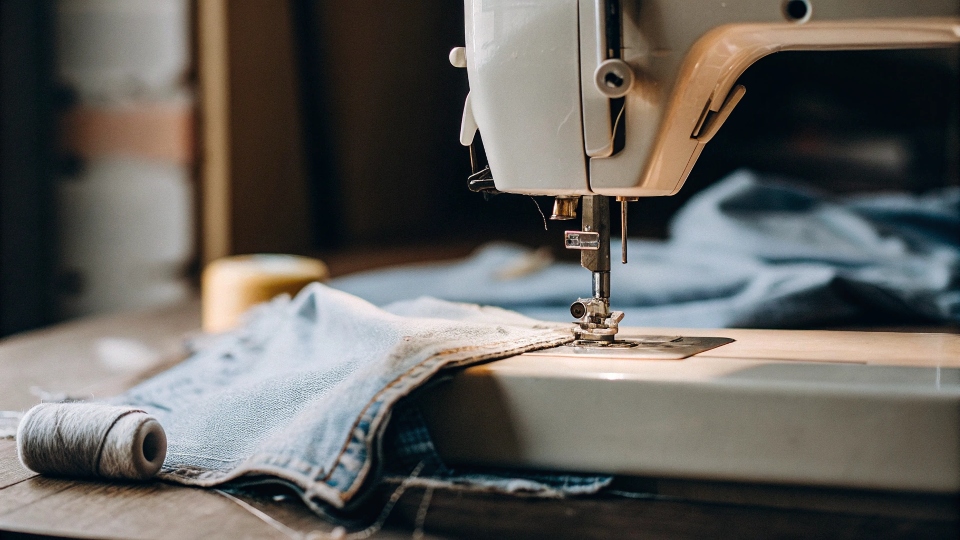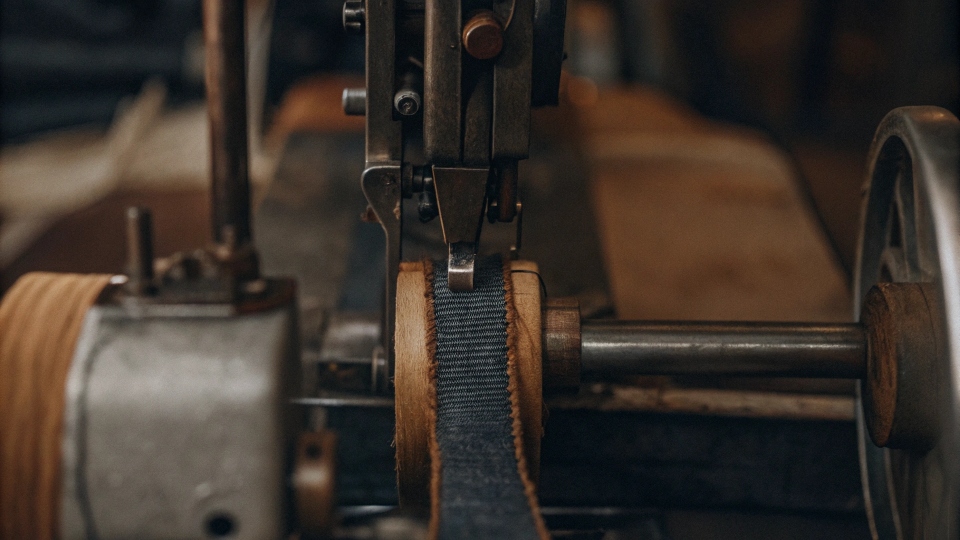You have a small sewing machine and a great idea for jeans. But you worry the machine is not strong enough. Let's look at what is possible and what is not.
A small or mini sewing machine1 is not suitable for constructing a full pair of jeans. While it might handle a single layer of lightweight denim for a simple repair, it lacks the power and durability for thick seams and heavy fabric.
In my two decades of making jeans, I have seen every type of machine you can imagine.
From massive industrial ones that stitch thousands of pairs a day to the machines designers like Dean use for their first samples. A common question I get is about the limits of smaller, home machines.
The truth is, the machine you use has a huge impact on the final quality of the garment. Let's break down what different machines can realistically handle when it comes to denim.
Can a Mini Sewing Machine Sew Denim?
You see those tiny, affordable sewing machines everywhere. They seem perfect for small projects. But when you try to sew denim, the needle breaks and the motor struggles. Frustrating, right?
A mini sewing machine can only sew very lightweight denim2 on a single layer. It will fail on thick seams, waistbands, or heavy denim due to its weak motor3, fragile parts, and inability to use proper needles.
I've seen beginners try to use these machines for serious projects, and it almost always ends in disappointment.
Mini sewing machines are designed for simple crafts with light fabrics like cotton. Denim is a completely different challenge. Their motors are very small, often less than 100 watts.
When you try to push a needle through multiple layers of denim, like at a hem or a belt loop, the motor doesn't have the power.
It will either jam completely, skip stitches, or even burn out. They also have very little "throat space," which is the area to the right of the needle.
Trying to maneuver a large, stiff jeans leg in that tiny space is nearly impossible. Think of a mini machine as a tool for quick fixes on a t-shirt, not for constructing a durable pair of pants.
Can a Regular Sewing Machine Sew Jeans?
You own a standard home sewing machine that you love. Now you want to make jeans, but you are afraid of damaging it. The good news is, you likely can do it with a few key changes.
Yes, a standard home sewing machine can sew jeans, as long as it is set up correctly. You must use a heavy-duty denim needle4, strong polyester thread5, and go slowly over bulky seams.
Your average home sewing machine has more power than a mini one, but it still has its limits. The key is preparation.
First, you absolutely must switch to a denim needle. These are thicker and have a much sharper point designed to pierce dense fabric.
Using a standard needle will cause it to bend or break. Second, use a quality, heavy-duty thread. Regular cotton thread will just snap under the tension. I recommend a polyester or a cotton-wrapped poly thread.
The biggest challenge will be sewing over thick areas6, like where the side seams meet the yoke and waistband. A great trick is to use a "seam aid7" or "hump jumper."
This is a small piece of plastic that you place under the back of the presser foot to keep it level as it approaches the thick seam.
This prevents the machine from stalling and gives you much more even stitches. With these adjustments, a good home machine can handle medium-weight denim (10-14 oz) for a personal project.
What Kind of Sewing Machine Is Needed for Jeans?
You are serious about making jeans and want professional, durable results. Your home machine just is not giving you the clean, strong stitches you need. It is time for a more powerful tool.
For high-quality jean construction, you need a heavy-duty or industrial sewing machine8. These machines have powerful motors, all-metal parts, and are designed to handle thick fabrics and heavy thread with ease.
In my factory, we only use industrial machines. Brands like Juki or Singer's industrial line are built for one purpose: to sew all day, every day, without failing. The difference is power and durability. An industrial motor can punch through eight layers of denim without even slowing down.
The feed dogs—the metal teeth that pull the fabric under the needle—are much stronger and grip the denim securely, preventing slippage and giving you perfect, even stitches.
For a serious home sewer or small-scale designer, a great option is a "heavy-duty" home machine. Models like the Singer Heavy Duty 44529 or Brother ST371HD10 are a good middle ground. They have stronger motors and more metal parts than a standard machine, and they can handle thicker needles and thread.
While not as fast or powerful as an industrial machine, they provide the strength needed for consistent, high-quality results on denim projects. They are built to handle the strain that denim puts on a machine.
What Is the Disadvantage of a Mini Sewing Machine?
The low price of a mini sewing machine is very tempting. But using the wrong tool can waste your time and expensive fabric. Don't let the price tag fool you into a bad decision.
The main disadvantages of a mini machine are its weak motor, fragile plastic construction, and small size. This leads to poor stitch quality11, constant jamming, and an inability to handle any serious sewing projects like making jeans.
Let's be very direct about this. For a project like making jeans, a mini sewing machine is not a helpful tool; it is an obstacle.
I would advise any designer to avoid them completely for sampling. The weak motor cannot create a strong, locked stitch in denim, meaning your seams will be weak and likely fall apart.
The parts are mostly plastic and can break under the strain of just a few thick seams. The tiny workspace makes it physically difficult to handle the fabric, leading to crooked seams and mistakes.
| Here is a simple breakdown of the problems: | Feature | Disadvantage for Sewing Jeans |
|---|---|---|
| Power | Too weak; causes skipped stitches and motor burnout. | |
| Build Quality | Fragile plastic parts break easily under tension. | |
| Stitch Options | Very limited; lacks reinforced stitches needed for durability. | |
| Workspace | Too small to maneuver large pieces of denim. | |
| Stitch Quality | Inconsistent and weak; not suitable for a wearable garment. |
In short, a mini machine is a craft toy. Using it for jeans will only lead to frustration and a poorly made product.
Conclusion
For making jeans, choose your machine wisely. A mini machine will fail. A regular machine can work with care. But a heavy-duty machine is your best choice for quality.
-
Explore the limitations of mini sewing machines to understand why they may not be suitable for denim projects. ↩
-
Learn how mini sewing machines perform with lightweight denim and what projects they are best suited for. ↩
-
Understand the problems associated with weak motors in sewing machines, especially for denim. ↩
-
Discover the significance of using a heavy-duty denim needle for achieving quality stitches in jeans. ↩
-
Find out why strong polyester thread is essential for sewing durable jeans and preventing thread breakage. ↩
-
Get tips on how to effectively sew over thick seams in jeans for a professional finish. ↩
-
Learn about seam aids and how they can improve your sewing experience with thick fabrics. ↩
-
Explore the advantages of heavy-duty machines for sewing jeans and achieving professional results. ↩
-
Discover the features of the Singer Heavy Duty 4452 that make it a great choice for denim projects. ↩
-
Find out if the Brother ST371HD can handle denim projects effectively and what makes it a solid choice. ↩
-
Explore the factors that lead to poor stitch quality and how to avoid them when sewing jeans. ↩









